Why in the World Collect Stamps?
written by Jean Lafortune
Collecting stamps is probably one of the most popular hobbies there is. You do not need a great knowledge to start just your curiosity and some patience. Your collection can reflect you interests, personality, profession or taste. Read the article and learn more about collecting stamps from our VMS Expert.
philatelic cover, greek stamps, crete stamp, souda issue
Collecting is natural
Collecting “objects ” or “ stuff ” as kids say, seems to be a kind of natural urge for many people, starting at a very young age. Most children will quite naturally pick up rocks or seashells or collect insects or sport cards. Sometimes this urge to collect continues on into adulthood. Some people also collect all kinds of objects such as postcards, silver spoons, miniature reproductions of favorite animals or wine glasses. Souvenirs bought during travels also sometimes make up considerable collections, filling curiosity cabinets and shelves around the house.
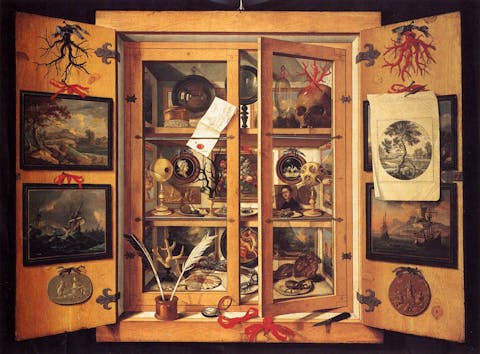
Domenico Remps, Cabinet of Curiosities (c. 1690) Image: Wikipedia / License: Public Domain
Stamps are different
If you collect art in all its forms , you are collecting objects that are by essence unique. In the case of books or porcelain or sport cards, you are collecting mass produced objects of private origin, and that means that the exact number originally produced cannot always be known and the possibility exists of reprints, copies or fakes .
Many categories mentioned above preceding examples because, like coins and currency, they are official government productions, having legal tender under the law for coins, and they are receipts with recognised value when used in the case of stamps.
When you buy a stamp in a post office, you are paying in advance for a government service you will use later when you mail a letter. This has legal implications that other collected objects do not have.
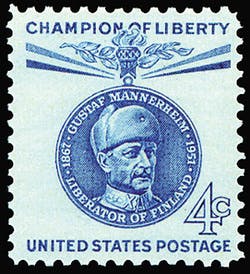
The US Mail postage stamp of Marshal C. G. E. Mannerheim from 1961. Image: Wikipedia /License: Public Domain
Why stamps?
Children are often attracted to stamps because they show the kinds of objects that appeal to them: animals like dinosaurs, cats and dogs, flowers, cars, sport scenes, comic strip characters, etc.
People will buy stamps as souvenirs of a trip, so souvenir shops often carry selections of nice but common stamps sold in packets for them.
See also: How to Become an Outstanding Philatelist
Others are curious and are intrigued by the sight of a stamp with a strange or unreadable country name, and want to know more about it. In some families, particularly in Europe, collecting stamps is a kind of family tradition passed on from one generation to the next, and carried on with a varying intensity of interest depending on the personality of the individual and the time available for stamps . Some just store the collection in a closet, to be taken out very occasionally to show to the next generation, while others delve into it with much time and passion. Still, others have no interest in stamps and are happy to sell them to the first interested buyer.
"The field of possibilities for a stamp collector is almost without limits. The reasons for collecting one type of stamps in particular can be linked to one’s personality, profession or experience."
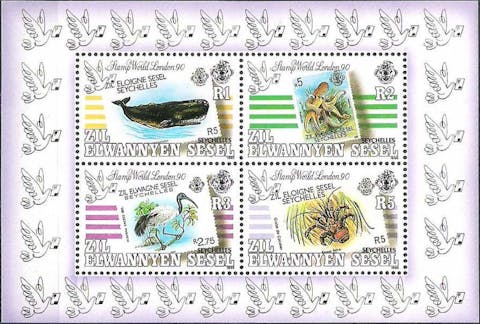
Stamp of Seychelles, Zil Eloigne Sesel, 1990. Image: Wikipedia / License: Public Domain
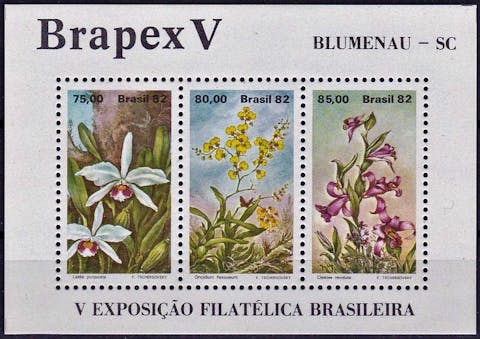
Stamp of Brazil, Three orchid species are presented: Laelia purpurata, Cyrtochilum flexuosum, Cleistes revoluta, 1982. Image: Wikipedia / License: Public Domain
What to collect? That is the question…
The field of possibilities for a stamp collector is almost without limits. The reasons for collecting one type of stamps in particular can be linked to one’s personality, profession or experience.
A musician or a music fan can connect to his trade or passion by collecting stamps showing musicians and composers or famous opera or concert houses. A gardener can collect stamps showing orchids, or roses, or cacti. A physician can collect stamps with famous doctors or the ones celebrating medical discoveries. A sports fan can collect stamps with racing cars, skiers, or golfers, the list of connections to one’s field of work or studies is literally endless.
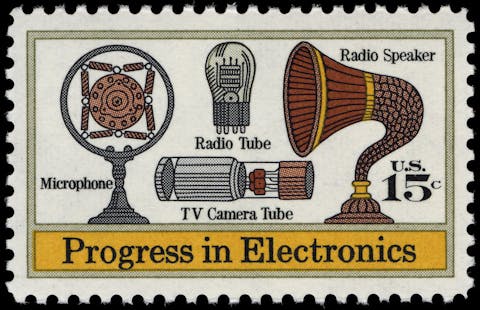
Progress in Electronics - Microphone, Radio Tube, TV Camera Tube, Radio Speaker - 15-cent 1973 issue U.S. stamp. Image: Wikipedia / License: Public Domain
A traveller can decide to collect the stamps of a country that he particularly enjoyed visiting. If you loved spending time discovering Portugal or Argentina, you can decide to collect stamps from that country. With a little bit of time and curiosity, you can start to build up an interesting collection of that country, and if you are curious enough and take the time to research the persons, objects and sites shown on the stamps, you will build up a remarkable body of knowledge about that country, and even revisit some of the sites you enjoyed while you were there.
Asking yourself questions such as : what do I like ? What am I curious about ? can help launch you into an interesting hobby which may turn out to be more captivating than you originally thought. Don’t be influenced by others, go for what you like !
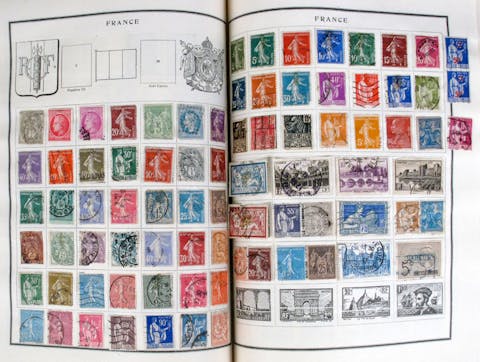
Modern Postage Stamp Album with French stamps. Image: bomont57 / License: CC BY 2.0
Long term benefits
If you collect for a good period of time, no matter what you decided to collect, you will steadily increase your general culture about a field of human activity or a part of the world, and become much more at ease with it, since your personal interest and your collecting interest will reinforce each other.
Stamp collecting can be carried on at home, with books and the internet as your companions, but it can also be a source of many interesting social contacts if you decide to join a club or a specialised society and start attending their meetings. Being with other collectors means being able to share knowledge and experience, and trading unwanted material for items you want. Some steady long term friendships can start this way.
Stamp collectors are usually eager to share knowledge with fellow collectors. If you like “showing off” your stamps and you like the challenge of competition, you can gradually start exhibiting your collection at the local level first, on a competitive or non-competitive basis, just for the pleasure of sharing your interest.
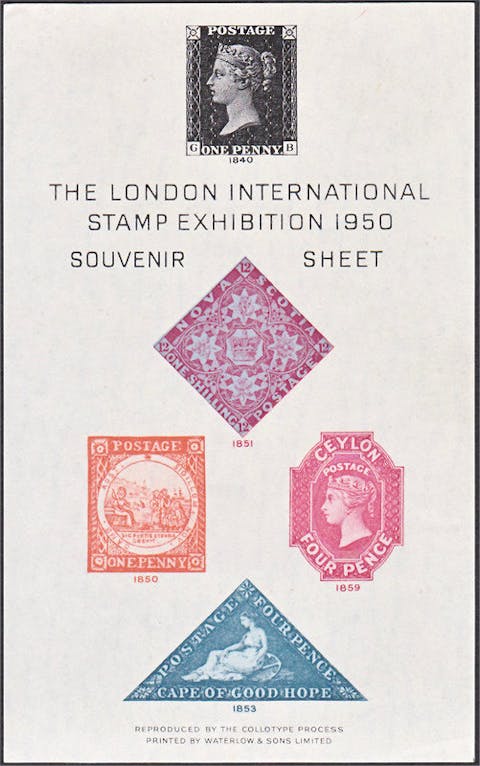
A non-postal souvenir sheet for the London International Stamp Exhibition 1950. Image: Wikipedia / License: Public Domain
"What is the difference between a stamp collector and a philatelist ? The short answer is experience and level of dedication."
Finally, stamp collecting, like a few other types of collections, namely coins and works of art, can even provide you with some kind of financial return on what you originally spent.
If you spent thousands of dollars or pounds playing golf , bowling or tennis, you will never get any money back, except the sale of your second-hand equipment, but you will likely get part of your money back if you sell your stamp collection, if it is well kept and you bought with some foresight and an eye for quality.
There is a well established market for stamps , with catalogues, dealers and auction houses in most developed countries when the time comes to sell.
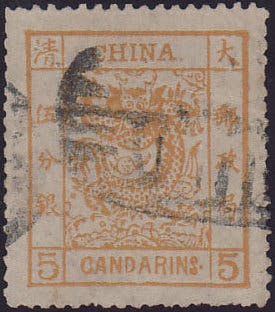
Red Revenue block of four and sheet of 25 5-candarin Large Dragon stamps 5-candareen stamp of 1878, Chinese Qing dynasty sold in 2009 for a whooping $21 500 000. Image: WIkipedia / Sourse: Public Domain
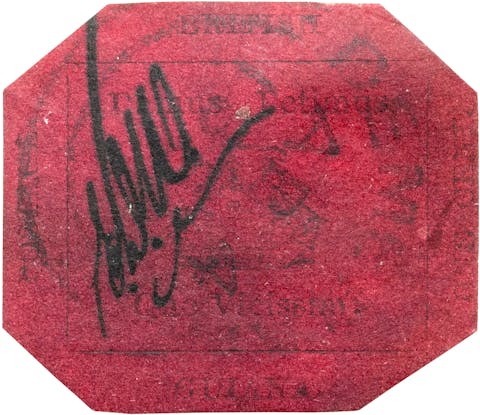
World's rarest stamp, British Guiana 1 cent magenta issued in 1856, sold at Sotheby's, New York in 2014 for record breaking $9 500 000. Image: Wikipedia / License: Public Domain
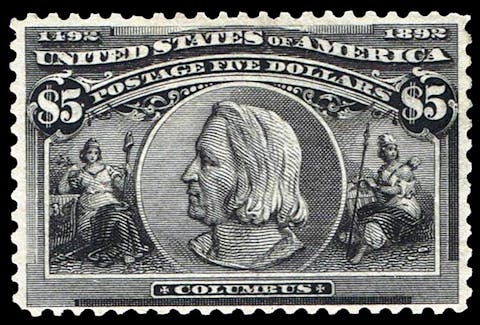
United States $5 postage stamp issued in 1892 depicting Columbus to mark the 400th anniversary of his first voyage in 1492, worth $1800. Image: Wikipedia / License Public Domain
Stamp Collecting vs Philately
What is the difference between a stamp collector and a philatelist ? The short answer is experience and level of dedication.
All philatelists can consider themselves to be stamp collectors, and in fact people start out as stamp collectors. But with time, the accumulation of knowledge and a greater level of dedication to the hobby, people become more curious about what they collect, they read about their hobby, build up a philatelic library, do research on their own and with the help of specialised groups and very often narrow down what they collect . They become very knowledgeable about a smaller area of stamp collecting. They can contribute to the specialised literature about their chosen field. It is basically a question of depth of knowledge and implication…
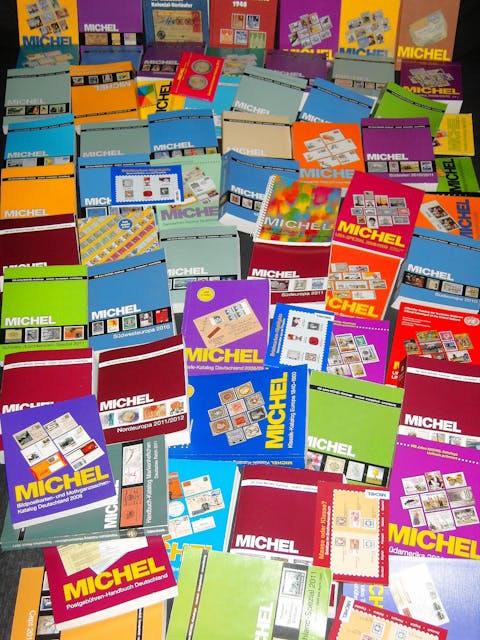
Stamp catalogues from the Michel range. Image: Nurliab / License: CC BY-SA 3.0
The types of Stamp Collections
Very briefly, stamps can be collected in a very wide variety of ways, depending on the type of material assembled.
The classic way is to collect by country, trying to put together as complete a collection as possible of all the stamps issued by that country, in mint or used condition.
Another very popular approach is to collect by theme or topic: the aim is to organise the stamps according to what they show: boats, airplanes, the conquest of space, butterflies, famous writers, country flags, etc.
Some people collect postal history, which means that they try to find covers and pieces of mail that show how the mail was transported, the rates applied , the additional services such as registration or airmail used , the various markings and cancellations that appear on the items, etc. This is a very popular field these days.
Finally, collecting fiscal stamps not issued for postage but to collect a wide variety of taxes and fees, or collecting unofficial commemorative, local , political or religious labels is also a marginal but popular field, with more and more catalogues covering such items. This field is called paraphilately but is also commonly referred to as “cinderella” philately, in reference to the fact that it was often left to the side, away from mainstream philately.
The only limit is your time and your imagination, but stamp collecting is for you if any of the reasons mentioned above are something you can connect to.
Happy hunting , this is a great hobby !
Start your stamp valuation here!
Jean Lafortune is of French Canadian origin and boasts a philatelic library of over 1,200+ volumes of literature relating to the field. The former president of Fédération québécoise de Philatélie, he is a regular contributor to the American Philatelic Society and his expertise is highly regarded.

